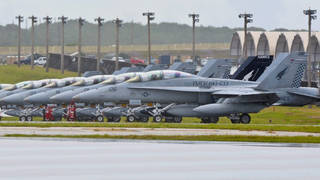On Guam, Resistance Grows to US Military Presence as N. Korea Threatens Missiles Off Island's Coast

The front page of Guam's Pacific Daily News reads "14 Minutes!" That's how long it would take missiles fired from North Korea to reach the U.S. territory in the western Pacific if there is an escalation of the threat of nuclear war between the U.S. and North Korea. On Thursday, Trump again threatened North Korea, saying if it were to carry out an attack on Guam, the U.S. would retaliate with military action. The Pentagon controls about a third of all the land on Guam, which is home to 163,000 people and a sprawling complex of U.S. military bases, including the Air Force base where many of the United States' B-2 bombers take off from before flying over the Korean Peninsula. For decades, residents of Guam have resisted the militarization and colonization of their homeland by the United States, which has now put them in the crosshairs of a possible nuclear war between the U.S. and North Korea. We go to Guam to speak with LisaLinda Natividad, president of the Guahan Coalition for Peace and Justice and a member of the Guam Commission on Decolonization, and with David Vine, author of "Base Nation: How U.S. Military Bases Abroad Harm America and the World."